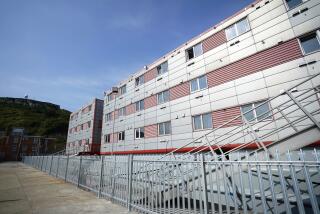REFUGEES : Forced Return of ‘Boat People’ Is a Signature Away : Britain and Vietnam are near an accord. The colony’s volatile detention centers are bulging at the seams.
- Share via
HONG KONG — Britain and Vietnam appear on the verge of signing an agreement that would pave the way for the mandatory repatriation of Vietnamese “boat people” who have been denied entry to Hong Kong.
The worsening problem of the boat people led to discussions in Hanoi at the end of September among the British, Hong Kong and Vietnamese governments and the office of the U.N. High Commissioner for Refugees.
The talks resulted in a joint statement by Britain and Vietnam pledging to accelerate the rate of return of “illegal immigrants,” a term used for the first time to describe those boat people who do not qualify for refugee status. The statement said such people “should return to their country of origin in accordance with international practices.”
Britain and Vietnam were originally scheduled to have put the scheme in motion on Wednesday, but their talks have dragged on in Hanoi.
Diplomats in Hanoi said Vietnam fears that if it signs the agreement, other countries will accuse it of violating human rights.
“This is a sensitive question,” one Asian diplomat was quoted by the British news agency Reuters as saying. “They are afraid not only of the reaction but also of demonstrations (in Hong Kong camps) or some other unfavorable developments.”
In December, 1989, Hong Kong caused an international outcry when it made its first and only compulsory repatriation of a group of boat people, mostly women and children. U.S. congressmen protested the loudest.
Vietnamese detention centers in Hong Kong are bulging at the seams. The number of boat people in this British colony reached a 12-year record high of 64,000 in September.
Only about 5,000 have qualified, under U.N. guidelines, as refugees for resettlement in other countries. Another 39,000 have yet to be screened, but only about one in six is expected to qualify. The remaining 20,000 have been rejected.
A Hong Kong government spokesman said Vietnamese officials have agreed to accept all those boat people classified as illegal immigrants. “Vietnam will not go back on its word,” he said.
Diplomats said the agreement is being carefully worded to avoid all references to the use of force in returning the emigrants. They also said it is expected to state that Vietnamese that arrive after a certain date in Hong Kong will be quickly screened and, if found to be non-refugees, flown back to Vietnam.
The expected signing of the agreement has heightened tension among Hong Kong’s boat people. Behind the barbed wire of Hong Kong’s Whitehead detention center, regarded as one of the most volatile camps, 12,000 refugees have been staging almost daily protests condemning the government over mandatory repatriation.
The protesters marched around their compound this week waving banners saying “Mandatory Repatriation Is a Crime” and warning that “Our Compatriots’ Blood Will Be Shed” when the policy is implemented.
Hong Kong security forces are standing by in case of any attempted mass breakouts from the centers.
Security forces say the Whitehead camp is a tinderbox, and they pointed out that the 26,000 Vietnamese in the center include former army officers who presumably could organize a larger protest.
The tens of thousands of Vietnamese who desperately seek better lives have chosen Hong Kong as their favored destination because of its largely benign policy toward boat people.
However, in June, 1988, the Hong Kong government decreed that new Vietnamese arrivals would be counted as non-refugees and would not be entitled to resettle unless they could prove that they were fleeing political persecution.
The United States is opposed to the forced repatriation of the boat people.
Rita Fan, a member of the Hong Kong legislature, argued that the solution to the problem depends not on repatriation but on the rebuilding of Vietnam.
“The Bush Administration’s decision to maintain economic sanctions on Vietnam for something that happened a decade ago is hindering the country’s growth,” Fan said. “This only punishes the Vietnamese people and forces them to search for a better way of life.”
More to Read
Sign up for Essential California
The most important California stories and recommendations in your inbox every morning.
You may occasionally receive promotional content from the Los Angeles Times.













